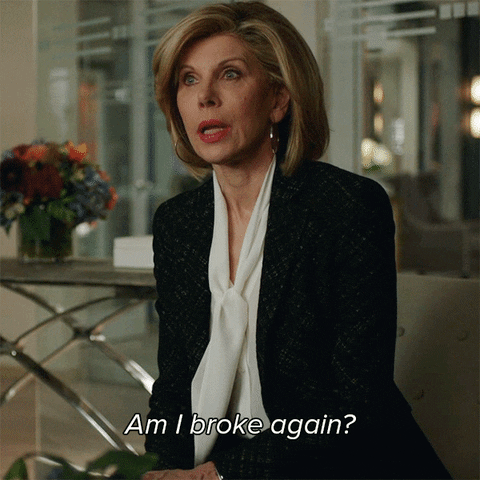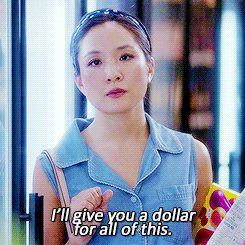I have a wicked competitive streak.
This may be why I take my credit score so seriously. When I get an email from Credit Karma saying my credit score has dropped, I want to know why – and pronto.
After all, keeping my credit score around 800 does more than stroke my ego, it provides easy access to credit when I need it, and at a competitive interest rate, too.
That’s why it’s smart to act quickly anytime you see a dip in your score. It may only take a few small tweaks to bump your score back up. That could spare you from higher interest rates and declined credit applications in the future.
What’s Ahead:
- 1. Someone opened credit accounts in your name
- 2. Your credit report has incorrect information
- 3. You submitted too many credit applications
- 4. You’ve recently added debt to existing accounts
- 5. You’ve missed payments
- 6. You negotiated a partial payoff
- 7. You cosigned on a loan that’s now past-due
- 8. You closed credit accounts
- 9. You paid off an installment loan
- Summary
1. Someone opened credit accounts in your name

If your credit report lists debts that aren’t yours, your identity has been compromised. That means someone has opened credit accounts using your personal information. The fraudster then shops away and leaves the bills unpaid. While you’re not legally responsible for the fraudulent accounts or charges, you will have to do some damage control.
Action steps after your identity is stolen
If identity has been stolen, you will need to initiate fraud alerts with all three credit bureaus, close the bad accounts, and get your credit reports corrected. This process takes legwork and time.
The federal government’s website, IdentityTheft.gov, can help you keep the action steps organized. After you answer a few questions about what happened, the site creates a step-by-step recovery plan to clean your credit report and safeguard your identity going forward.
Credit Karma can help here, too. Credit Karma provides free, year-round identity monitoring, plus access to your TransUnion and Equifax credit files.
2. Your credit report has incorrect information
Your credit score may also be affected by incorrect information that’s not related to identity theft. For example, your report may show late payments when you’re certain you’ve never missed a due date.
Or, a stranger example: I once found an unpaid car loan on my credit report that belonged to my roommate’s ex-girlfriend. It wasn’t identity theft, and I’m not certain how it got linked to me. You can and should dispute these inaccuracies.
How to dispute errors on your credit report
If you find errors on your credit report, the FTC recommends mailing a written letter to the bureau. You can find bureau addresses and links to each bureau’s dispute process on the FTC’s consumer website.
In my case, I did have the car loan removed from my credit history, even though I didn’t have any of the loan documentation. Your situation may require more proof. If you are disputing an amount or payment record, provide whatever information you can to support your side of the story.
You can also file disputes online. Each of the three bureaus has an online dispute center. Or, you can file a TransUnion dispute through your Credit Karma account.
3. You submitted too many credit applications
Every hard inquiry on your credit report puts a small ding in your credit score. Several in quick succession can have a noticeable impact. The issue is that opening multiple new credit accounts at once raises the chances of you getting overextended.
Of course, that risk may not apply to you at all. Perhaps you’re taking advantage of historically low interest rates to refinance your car, home, and a personal loan, for example. While that is a smart move on your part, the credit score formula doesn’t address that scenario very well – which is why you might see your score drop even though you’ve moved into debt with better terms.
What to do when you’ve applied for too many credit accounts
If the decrease in your credit score doesn’t affect any loans you’re trying to get, the easiest strategy is to wait. Your score should bounce back as you continue repaying debts as scheduled.
For an immediate fix, you can also try Experian Boost™. It’s a free service that connects your utility, internet, and Netflix bills to your credit history. If you’ve been paying those bills on time, adding them to your report can raise your score. If you don’t pay those bills on time, you may not see any change – since Boost actually ignores any late payments on those accounts.
I recently gave Boost a go and saw a five-point increase to my credit score within minutes!
4. You’ve recently added debt to existing accounts

How much credit you use relative to how much credit you have is one of the larger factors in your credit score. Say you have a single credit card with a limit of $10,000. If you make a charge of $1,000, you’re using 10% of your available credit. That percentage is called your credit utilization rate.
An acceptable credit utilization rate is below 30%. If you’re targeting a superior credit score in the 800s, keep your credit utilization rate below 6%.
How to lower your available credit usage
You can address a high utilization rate by raising your available credit or lowering your outstanding debt. To make an impact fast, do both.
If you are in good standing with your credit card companies, call them up and ask for credit line increases. This strategy only works if you can resist the urge to charge up to your new limit. That’s not always easy. If you’re worried about it, then tackle the other side of the equation instead and pay down your balances.
Dramatically reducing your debt balances also isn’t easy, but your credit card company can help here, too. Ask for a lower interest rate. If your card provider complies, that should help you pay down the balance faster.
5. You’ve missed payments
Your payment history is the most influential component of your credit score. So late payments, missed payments, foreclosures, and repossessions will have a noticeable impact. Whatever change you see in your score should correlate to the severity of the issue. A single late payment, for example, shouldn’t cause a big change, but a series of missed payments would.
Your payment history can include non-debt accounts, too. Unpaid medical bills are often the big culprit, but late rent payments and past-due utility bills can also be reported to the credit bureaus.
What to do if you’ve missed payments
First, identify why you’ve fallen behind on your bills. Maybe you’re not great with dates and deadlines. That’s an easy fix.
Next, set up automatic payments in the minimum amounts for all your accounts. You’ll have to keep enough cash in your checking account to cover those payments, but if the money’s there, the bills get paid.
The other explanation is you’re not making enough relative to your bills and spending. This is obviously a more complex issue. Start by listing your income and expenses, so you can quantify the difference between the two.
As you review where you’re spending, look for areas to cut back. See if you can build a budget that’s balanced and sustainable. Getting into a rhythm of paying your bills on time should slowly raise your credit score. You’ll also save on late fees in the process.
If there’s no way to balance your budget, you could consolidate your debt through a nonprofit debt counseling agency. This could cause another decline in your credit score, but it will help you regain control over the bills. As you develop a pattern of repaying debts on time, your score should begin to tick up.
6. You negotiated a partial payoff

Negotiating a settlement amount with a debtor can help you recover from too much debt, but it won’t do your credit score any favors. If you close an account for less than the original amount, it’s flagged on your report as “settled” – which is more negative than “paid in full.”
According to Experian, the settled account remains on your credit history for seven years from the date it was originally past due. If the account wasn’t past-due yet, the seven-year clock begins the day you settled.
What to do if your score drops after negotiating a partial payoff
Experian Boost may help here, too. Alternatively, you can wait it out and keep paying the rest of your bills on time. If you stay current with everything else, your score should move up slowly. At the seven-year mark, that settled account falls away and stops affecting your credit score.
7. You cosigned on a loan that’s now past-due
Cosigning on a loan seems like a harmless favor, right up until the borrower misses a payment. That loan and its payment history do appear on your credit report. If the account falls past due, your credit score suffers.
What to do when the loan you cosigned affects your credit score
Check-in with the borrower to find out why he or she is missing payments. You may have a tough choice to make – between accepting the credit score consequences or making the loan payments yourself.
Once you sort out what’s happening with the cosigned loan, you can take other steps to repair your credit. You should be in good standing with your other credit accounts; try asking for credit line increases to lower your utilization rate. Or, if you can, pay off a credit card balance but leave the account open.
8. You closed credit accounts
Closing out unused credit cards can lower your credit score because it raises your utilization rate. Say you have three credit cards: a VISA, Mastercard, and a Kohl’s credit card you opened to save 20% at the register. Each has a limit of $3,000. You have $2,500 outstanding on your Mastercard.
With all three accounts open, your utilization rate is about 28%. Close out the Kohl’s card and your available credit drops to $6,000, pushing your utilization rate up to 42%.
What to do when your score drops from closing accounts
In this case, your score should rebound eventually if you keep paying your bills on time. Unless you need a new loan soon, waiting for that rebound is the simplest solution. Alternatively, you can ask your other accounts for credit line increases to offset the available credit lost with the closed account.
9. You paid off an installment loan

A smaller factor in your credit score is the mix of debt types you maintain, such as revolving credit accounts and installment loans. If you have a single installment loan and you pay it off, that repayment could cause your credit score to drop. This happens because your credit mix is less diverse after the payoff.
What to do if your credit score drops after paying off an installment loan
Paying off your installment loan shouldn’t cause a big drop in your credit score. If you need an immediate fix, a service like Experian Boost may help to offset the change. Or, wait this one out. The change should not be dramatic, and your score will rebound if you are managing your other accounts on time.
Summary
Your credit score can fluctuate daily. If you haven’t changed anything about your debt load or the way you manage your payments, those daily fluctuations should be minor. The only exceptions are if your identity has been compromised or inaccurate information has been added to your credit file.
Often, you can easily rebound from those smaller changes in your score. Others, you might have to work a bit harder to fix. Just make sure you address the drop!


